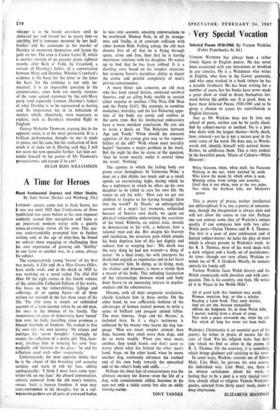short Sentimental Journey and Other Stories. By [talc) Svevo. (Seeker
and Warburg, 35s.)
A Time for Heroes
short Sentimental Journey and Other Stories. By [talc) Svevo. (Seeker and Warburg, 35s.) Lrrenanv success came late to Italo Svevo, for It was not until 1925 that Confessions of Zeno (published two years before at his own expense) suddenly earned him recognition and fame as an important modern writer with a quietly ironic-pessimistic vision all his own. This suc- cess understandably prompted him to further writing and, at the age of sixty-five, he found no subject more engaging or challenging than his own experience of growing old. `Senility' in one form or another was, in a sense, always his subject.
The comparatively young `heroes' of his first two novels, A Life and As a Man Grows Older, have senile souls, and at his death in 1928 he was working on a novel called The Old Old Man. Of the eight stories in this fourth volume of the admirable Collected Edition of his works, five focus on the vulnerabilities, failings and sufferings of an ageing figure—all of them written (or revised) in the last three years of his life. The title story is simply an unfinished account of a train journey taken by an old man, for once in the absence of his family. The monotonies of years of domesticity have 'rusted' him over, he feels; travelling alone promises a blessed interlude of freedom. `He wanted to live his own life—his own journey.' He relaxes and indulges his `secret thoughts.' Cunningly he studies the reflection of a pretty girl. This, how- ever, involves him in noticing his own `irre- mediably old' features in the glass: `he and his reflection eyed each other suspiciously.'
Unfortunately, the man opposite thinks that he is the object of this brooding and accusing scrutiny and starts to rub his face, adding apologetically: `I think I must have some type- writer-ink on my face.' An absurd conversation, entirely removed from the old man's reveries, ensues. Such is human freedom. A man may sown unimpeded in his thoughts, but in a rail- weria rriagektihre are all sorts of awkward bodies to take into account, amazing conversations to be overheard. Human flesh, in all its strange- ness and frailty, is in constant collision with other human flesh. Falling asleep, the old man dreams first of all that he is flying through space, alone and free, then that he is having incestuous relations with his daughter. He wakes up to find that he has been robbed. It is a dazzling story based on the simplest situation, but evincing Svevo's matchless ability to depict the comic and painful complexity of man's private consciousness.
A more bitter tale concerns an old man who has keen sexual desires, animated cerebral theories, and an ailing body unable to sustain either impulse or intellect (The Nice Old Man and the Pretty Girl'). His attempts to combine medicines, morality, and the last flickering appe- tites of the body are comic and sombre at the same time. But his intellectual endeavours have a more mordant conclusion. He sets out to write a thesis on 'The Relations between Age and Youth.' When should the innocent appetites of the young give way to the reponsi- bilities of the old? 'With whom must morality begin?' becomes a major problem in his work. But the night he dies he stares at the question, `then he wrote wearily under it several times the word: Nothing.'
The agonies to which the failing body are prone recur throughout. In 'Generous Wine,' a man on a diet drinks too much and as a result spends an excruciating night, during which he has a nightmare in which he offers up his own daughter to be killed to save his own life. He wakes to ask his wife: 'How can we get our children to forgive us for having brought them into the world?' In 'Death,' an unforgettable account of a man's last moments, unfinished because of Svevo's own death, we again see physical vulnerability undermining the assertions of the mind. Roberto, an atheist stoic, intends to demonstrate to his wife, a believer, how a rational man can die. But despite his bravery and resolution, the atrocious pain which attacks his body deprives him of this last dignity and reduces him to weeping fear: 'His death was the very thing he had not wanted—a thing of terror.' As a final irony, his wife interprets his death-bed anguish as repentance and in her heart she 'converts' him. In dying, as in living, man, the thinker and dreamer, is more a victim than a master of his body. This unfading fascination of the relationships between mind and body drew Svevo to an increasing interest in psycho- analysis and the subconscious.
Dreams, with all their enigmatic revelations, clearly fascinate him in these, stories. On the other hand, he was sufficiently dubious of the advantages of human mental powers to write a series of brilliant and pungent animal fables. The most famous, 'Argo and his Master,' is included here. In it a dog's testimony is collected by his master who learns the dog lan- guage. 'Men are much simpler animals than dogs, because they smell more than dogs, and do so more readily. When one man meets another, they touch hands and don't seem to worry about what lies behind the other man's hand. Argo, on the other hand, when he meets another dog, cautiously advances the toothed end of his own body towards the untoothed end of the other's body and sniffs. . .
Perhaps the sheer fact of consciousness was the ultimate mystery for Svevo—even the life of a dog, with consciousness added, becomes in his eyes not only a richly comic but also an oddly moving matter.
TONY TANNER






























 Previous page
Previous page